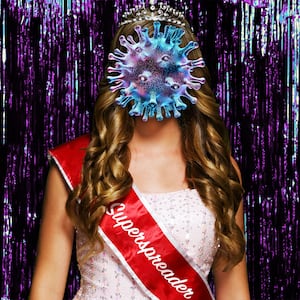Editor’s note: After this story was published, the Kappa Delta Farm Party was canceled.
Members of the Kappa Delta sorority at the University of Alabama in Tuscaloosa were getting ready on Tuesday for a massive party that, in any other year, would be a routine event.
The main difference—besides safety measures like face masks—in a nod to the pandemic? Instead of 600 people at once, organizers promised to bus in three “shifts” or groups of 200 revelers at a time.
But in the middle of the spiraling coronavirus surge nationwide, the city’s residents demanded answers to one very simple question: Why did the school, and the city’s leaders, endorse a massive, alcohol-fueled party right before sending students home for the holidays?
“It’s appalling and dangerous,” 61-year-old radiation therapist Louise Manos told The Daily Beast, arguing that “the four members of the city council who voted in favor of this” were “sanctioning a superspreader event.”
After this story was published, Monica Watts, a spokeswoman from the University of Alabama, told The Daily Beast on Tuesday evening that “the sorority ended up canceling this event.” When asked for more information, all Watts would say was that it had been decided “this evening.”
In an email late Tuesday, Kappa Delta’s national communications manager Sarah Anderson provided a statement to The Daily Beast from the local chapter: “While we followed all local guidelines and protocols in getting the event approved by the University of Alabama Office of Student Involvement and the City Council, we made the decision to cancel it to protect the health and safety of our campus community, guests and our members.”
As of Tuesday, there were 11,886 confirmed cumulative cases of COVID-19 in Tuscaloosa County, with 148 deaths. There were 76 new cases overnight, according to the Johns Hopkins Coronavirus Resource Center, and local reports indicate that infections of the virus have been rising in recent weeks.
But the city council voted last Tuesday to approve a special events retail license for the Kappa Delta Farm Party, to be held on Nov. 17 at a venue called Black Warrior Farms. The move—at a time when so-called Third Wave coronavirus cases are skyrocketing and holiday travel was expected to feed new clusters—befuddled everyone from locals to frontline medical workers to university employees.
<p><em><strong>Do you know something we should about the coronavirus, or how your local or federal government, school, or business </em></strong><strong><em>is responding to it? Email Olivia.Messer@TheDailyBeast.com or securely at <a href="mailto:olivia.messer@protonmail.com">olivia.messer@protonmail.com</a> from a non-work device.</strong></em></p>
Casey Johnson, from Special Events Management, who planned the farm party in coordination with another company and the sorority, said at the meeting that organizers expected 600 people in three shifts on the 14-acre farm. She added that each group of 200 people would have their body temperatures checked before getting on chartered buses, which would transport all attendees the six miles to the venue. Attendees were expected to wear masks at the event, which was slated to take place outdoors.
The 4-2 city council vote in favor of the farm party was first reported by a local blog.
“I want to make sure that the council understands that this is not a group of 600, 800, or 1,000 people at the event at one time,” Johnson told city leaders at the meeting. “This will be done in shifts. So we will have essentially a six-hour party. They will sign up for three different shifts. They will load up on a bus. They are not allowed to come in any other way to the venue.”
At the meeting, Tuscaloosa City Council President Cynthia Almond said the decision was a “difficult” one for her.
“We have recently shut down businesses and not allowed this kind of activity,” she said. “Today, we’ve had a report that our numbers locally are increasing.”
Ultimately, Almond voted no, explaining, “I have a real concern about the ability of these kids, these young adults, to socially distance.”
In the end, the vote passed, with only Almond and councilman Lee Busby against the measure.
On Wednesday morning, after The Daily Beast’s story about the event was published, city councilor Phyllis Odom said she “deeply regret[ed] voting in favor of this party, which goes against everything I believe about the spread of the coronavirus.”
“It was careless and irresponsible, and I apologize to the citizens of Tuscaloosa,” she wrote. “It clearly sends the wrong message our community.”
In an interview with The Daily Beast on Tuesday, Busby said he wasn’t “on the warpath” about it, but that a large, alcohol-infused party in the middle of a pandemic “just struck me as not a good idea.”
“It’s just that simple,” said Busby. “The organizers of the party did do a good job of presenting all the precautions, so I understand the impact that had on the collective vote, but I just didn’t think it was a good idea that had to happen right now.”
When even weddings that start out well-distanced and mask-compliant have fallen into drunken messes after alcohol was introduced, it’s easy to imagine what a giant sorority party might have ultimately looked like—even outside, even with precautions.
“Alcohol will be served, but we’re expecting them to wear their masks,” said Katie Sandlin, a 33-year-old biologist who works at the university-affiliated Genomics Education Partnership. “Are you serious? Do you know college students? Do you see how they behave at football games? Come on now, get real.”
Pulmonologist and critical care doctor David Thrasher, who is based in Montgomery, Alabama, had a similar view of the danger: “It doesn’t take but one mistake to get critically ill or die.”
“I’m treating a person right now who was going to have a four-person event outside, and it rained, and they held it indoors, and now they’re critically ill,” Thrasher told The Daily Beast.
The pulmonologist has been in the COVID trenches since this summer, and on Tuesday said he was still, frankly, exhausted.
“Cases are going up, hospitalizations are going up, and death cases will go up,” Thrasher said of Alabama. “We’re not as bad as we were in June, but we’re headed that way.”
“Now, they’re doing the right thing by having it outside, assuming there’s no bad weather,” he added. “If everybody wears a really, really good mask and a face shield and stays six feet apart, that’s pretty good.”
But when pressed on what his advice would be to an individual student, if they were his son or daughter, Thrasher said, “Oh, I would not let my kid go to this.”
“This is where the superspreader problem arises—some kids are going to be wearing that mask around their chin,” he told The Daily Beast. “With alcohol involved, they’re going to let their guard down.”
And precautions like temperature checks, Thrasher said, aren’t that helpful when a large portion of cases are asymptomatic.
At the city council meeting, city attorney Glenda Webb said her office had coordinated with the university and that there were no “outstanding issues.”
Councilman Busby asked Johnson, the party's organizer, if the gathering was “in compliance with the university student guidelines,” to which she replied, “Yes, sir.”
But the University of Alabama’s comprehensive health and safety plan notes that “both on-campus and off-campus student events must be approved by the Vice President of Student Life and are subject to the parameters listed below,” which includes an attendance limitation of 100 students for outdoor events.
In a previous statement on Tuesday, the university told The Daily Beast that it “has required the chapter to follow extensive rules and safety guidelines,” including “a 30-minute pause between each group’s arrival/departure is required for cleaning/sanitizing of tables, chairs and overall venue,” and a 50 percent rider capacity on each bus.
Requests for comment from The Daily Beast to all other city council members, Black Warrior Farms, Kappa Delta’s local chapter, and both companies that planned the event were not returned on Tuesday.
For 22-year-old Sabrina Snowberger, a full-time staff member at The University of Alabama who has “a significant amount of direct, in-person interaction with students,” the party didn’t feel like just an irresponsible choice, but one that could put her or her parents in personal danger.
“I haven’t been able to see my parents since December 2019,” Snowberger told The Daily Beast. “I do not want to risk their health coming from a hotspot like Tuscaloosa when I have such close contact with students.”
“This party, especially the timing, is a recipe for disaster,” she added. “And I’m worried people will infect or even lose family members or loved ones as a direct result of the virus spreading at this event.”








